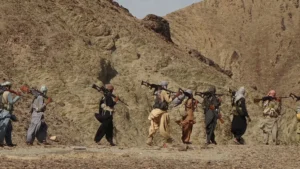When the United Nations honoured the inaugural International Day of Remembrance and Tribute to Victims of Terrorism on August 21, 2018, it was a historic occasion. This tragic event serves as a reminder of the threat that terrorism poses to the entire world and the unyielding spirit of those who have experienced its vengeance. Particularly in the face of terrorism, Pakistan serves as an example of tenacity and bravery. The country has waged a tenacious war against terrorism for the past 20 years, demonstrating an unshakeable dedication to making the globe safer for its people and others.
The horrible events of September 11, 2001, left an irreparable mark on the world. A new era in global security began with the United States’ “With us or against us” declaration, which sent shockwaves across the international community. Unfortunately, Pakistan too experienced a turning point during this time. The nation had not experienced significant waves of terrorism until 9/11. However, the succeeding American invasion of Afghanistan resulted in a fundamental change in the region’s militant group landscape.
When Pakistan joined the front lines of the war against terrorism, it was faced with a challenge unlike any other. It still took on this task head-on with a ferocious determination to protect its land, its people, and its ideals. In the midst of hardship, Pakistan’s courageous security forces and resilient populace stood out as beacons of hope. Combating terrorism was now a worldwide mission rather than merely a national responsibility.
The APS massacre in Peshawar on December 16, 2014, was the greatest act of terrorism committed against innocent children. It was the biggest number of children to die in a single terrorist strike in the history of the planet.
It is impossible to overstate how much terrorism has affected Pakistan. Tens of thousands of men, women, and children lost their lives as a result of the numerous terrorist strikes that plagued the country. In addition to the destruction they caused, these attacks caused significant economic losses that are thought to have totaled roughly $102.5 billion. In addition to negative financial effects, the nation’s religious and cultural fabric was severely harmed. These atrocities have left long-lasting wounds; many people and communities are still dealing with the devastation they have brought about.
The APS massacre in Peshawar on December 16, 2014, was the greatest act of terrorism committed against innocent children. It was the biggest number of children to die in a single terrorist strike in the history of the planet. The incident, which targeted defenseless youngsters, shocked people all around the world. It served as a sobering reminder that no one is immune from terrorism, not even the most defenseless members of society. The APS massacre continues to be a somber episode in Pakistani history, highlighting the critical requirement for coordinated measures to confront terrorism and its dreadful repercussions.
Other regions were also affected by terrorism. State-sponsored terrorism has wreaked havoc on innocent lives in Indian-occupied Jammu & Kashmir (IIOJK). A spiral of extrajudicial killings and human rights violations has resulted from the deployment of harsh laws like the Public Safety Act (PSA) and the Armed Forces Special Powers Act (AFSPA). The cruelty of terrorism is felt by the people of Kashmir, just as it is by those of Pakistan.
Pakistan has not only lamented its losses throughout this difficult journey, but has also honoured the heroes who have come out of the shadows. The nation’s commitment is exemplified by the memory of Aitzaz Hassan, a brave young man who gave his life to save others during a suicide bombing attempt. Pakistan’s military forces have also contributed significantly to the security of the nation and the establishment of enduring peace.
The path to advancement has not been without obstacles. Pakistan experienced 319 acts of terrorism in 2020, a considerable decrease from the peak of approximately 4,000 events in 2013. The National Action Plan (NAP) was crucial in ending the threat of terrorism in the nation, demonstrating the efficacy of an all-encompassing anti-terror policy.
But the fight against terrorism extends beyond Pakistan’s borders. India, Pakistan’s neighbor, has been charged with employing terrorism as an instrument of foreign policy, particularly in its efforts to destabilize Pakistan. Unproven evidence suggests that India is sponsoring and assisting various terrorist organizations, with devastating repercussions for Pakistani innocent lives.
The international community must unify in the face of terrorism, acknowledging its indiscriminate nature and the wide-ranging effects it has. The struggle Pakistan has waged against terrorism serves as an example of tenacity, and the unbreakable spirit needed to build a society free of the horrors of terrorism. The first International Day of Remembrance and Tribute to Victims of Terrorism serves as a wake-up call to the fact that the war against terror is still going on, and that we all need to keep cooperating to create a society that is safer and more peaceful for coming generations.
The author frequently contributes on issues concerning national and regional security, focusing on matters having critical impact in these milieus. She can be reached at: omayaimen333@gmail.com
Courtesy by Omay Aimen – Daily Times
Omay Aimen is a researcher, with an interest in national security, international politics, hybrid warfare & geopolitics. She can be reached at manahil.jaffer786@gmail.com




